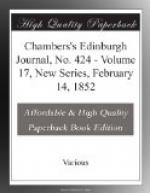In such pursuits, Mainzer—by this time dubbed doctor by a German university—passed five years very pleasantly, but, in a worldly point of view, very unprofitably. He had failed on first coming to Edinburgh in obtaining the musical chair, which seemed so appropriate a niche for him; and however reluctant to leave his favourite normal classes and his adopted home, still when he looked to the future, he was compelled to think of leaving Edinburgh—for the German proverb still held true: ‘Kunst geht nach brod;’ and if man cannot live by bread alone, neither can the artist live without bread! At this juncture, the Chevalier Neukomm, of European celebrity as a composer and organist, and a valued friend of Dr Mainzer, came to Edinburgh to inspect his friend’s normal classes. He was so much delighted with them, and considered Dr Mainzer so little appreciated by the general public, that he persuaded him to try Manchester as his future field of exertion.
In the autumn of 1848, accordingly, Neukomm introduced Mainzer to the leading men of that city, who received him so cordially, that he at once took his proper position, and entered on a career both useful and profitable, and which continued to be increasingly successful, until at Christmas 1850, he was laid aside by ill-health. Over-exertion had brought on a complication of diseases, to which he was a martyr for ten months, and which terminated fatally on the 10th November 1851. During that long period of intense suffering, his active mind was never clouded nor repining, and at every interval of comparative ease, he read or listened to reading with avidity. During the first months of his illness, he superintended the publication of a new musical work, called The Orpheon, two numbers of which appeared; and his last exertion in this way was arranging two songs: The Sigh of Charles Swain, and Longfellow’s Footsteps of Angels, adapted to Weber’s last song. Prophetic requiems both!
A few weeks after his death, the hall which had been built in Edinburgh for the classes of the Association which he founded, was opened by an amateur concert given as a tribute to his memory. He had promised to preside on this occasion; but his place was filled by his aged, but still vigorous friend, the Chevalier Neukomm, who had come to Edinburgh, at the request of the Association, to compose a series of psalms, one of which was sung by the pupils. Music for the Psalms, adapted to the varying meaning of each verse, has hitherto been a desideratum in the musical world; now being supplied in Chevalier Neukomm’s work, and already subscribed for by no mean judges—the Queen and Prince Albert, the king of Prussia, &c. It was touching, and yet gratifying, to see one of Dr Mainzer’s oft-cherished hopes realised for the first time that evening—that of the musical union of accomplished amateurs of private life with the pupils of the normal classes.




